Jet Pilot
Brief Synopsis
Cast & Crew
Josef Von Sternberg
John Wayne
Janet Leigh
The United States Air Force
Jay C. Flippen
Paul Fix
Film Details
Technical Specs

Synopsis
At an Air Force base in Alaska, expert pilot Col. Jim Shannon receives word from dispatch that a Russian plane is circling overhead. He orders Maj. Rexford to escort the plane down without injury, and once it has landed, is shocked to discover that the pilot is beautiful young Soviet lieutenant Anna Marladovna. In almost perfect English, Anna, insisting that she be treated with respect, states that she has defected because she fears she will be killed for disobeying orders. Jim does not believe her, but after she asks to shower and begins to remove her clothes in front of him, grows fascinated by her. He then escorts Anna to his superior, Maj. Gen. Black, who offers her sanctuary but in return demands facts and figures about Russian operations. She refuses, prompting Black and Maj. Lester Sinclair to order a reluctant Jim to seduce her in order to gain inside information. To this end, Anna is treated as a guest of the Air Force and assigned her own jet. Over the next few days, she and Jim impress each other with their skilled flying, and with each question she asks, he deduces more about how the Russians fly and where their expertise is deficient. One night, Anna asks for more training, and in response, Jim kisses her and whisks her off to Palm Springs, California, for a weekend trip. There, she becomes enthralled by what she deems "capitalist luxuries" such as steaks, lingerie and large hotel rooms. At night, Jim and Anna kiss again, and agree that they find each other attractive in every way except politically. When they meet up with Rexford and his wife Georgie, however, Anna invites them and another young couple to share her and Jim's room. Jim is annoyed, but he soon receives word that Anna is about to be deported, and rushes her out of the hotel. As they fly side-by-side in their jets, Anna radios to Jim that she does not want to leave America, and he decides to marry her in order to save her from deportation. When the happily married couple returns, however, Black takes Jim aside and informs him that Anna is actually a spy named is Olga Orliev, and he and Jim devise a secret plan to have her bring Jim back to Russia where he can spy on the Soviets. Jim returns to their hotel room and plays Anna a recording of her revealing secrets to a Russian agent, and although she fears Jim will kill her now that he knows she is a spy, he confesses that he still loves her. They enjoy several more days of romance, and then Jim tells Anna that he has been reprimanded and that she is to be jailed, then deported. While Black watches from the command post, Jim and Anna sneak onto jets and fly back to her station in Siberia. There, her commander, Vassily Sokolov, places them in separate bunks and subjects Jim to questioning each day. When he deduces that Jim is only giving information that the Russians already have access to, he orders Anna to convince Jim to fly their newest fighter jets. Knowing the jets are unsafe, Anna tries to object, but threatened with a transfer, she visits Jim at night to seduce him into complying. She tells him she loves him, and although he does not believe her, he agrees to fly the fighter. Moments later, he reveals that his agreement does not matter, since the fighter is already outdated, and responds to her outrage by ripping her clothes and locking her outside, half naked. Finally, he lets her in and they share another night of passion. Later, however, she finds a matchbox on which he has been making notes, and realizes that he is figuring out, from Sokolov's questions, what data the Russians lack. Anna is furious that Jim has lied to her, especially after he assures her that she will help him escape. Instead, she threatens to turn him in, after which the Russians will use him as a double agent. After he demands to know if she loves him, she leaves without responding. When she calls Gen. Dmitri Langrad to inform on Jim, however, she finds that she cannot betray him, and later worries that he will be hurt while flying the fighter jet. Just as he boards the jet, she learns from Col. Matoff that they have been secretly feeding Jim a memory-impairing drug and now plan to administer a huge dose, which will destroy his mind. To save him, she eludes a guard who has been assigned to watch her, and then jumps into a jet. She flies near him and radios for him to follow her, shooting down Russian planes to protect him. Chased by more planes, together they fly to safety and land near the American embassy in Vienna. Weeks later in Palm Springs, Anna declares that she prefers steak to Communist ideology.

Director

Josef Von Sternberg
Cast

John Wayne
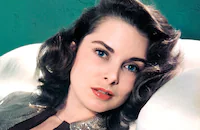
Janet Leigh
The United States Air Force

Jay C. Flippen
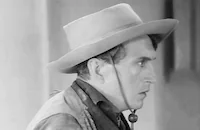
Paul Fix
Richard Rober

Roland Winters

Hans Conried
Ivan Triesault
John Bishop
Perdita Chandler
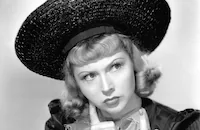
Joyce Compton
Denver Pyle
Elizabeth Flournoy
Jack Overman

Ken Tobey
Harry Lauter
Carleton Young
Jimmie B. Smith
Bret Hamilton
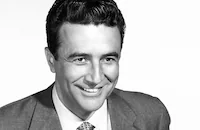
Rick Vallin

Jim Brown
Buck Young
Hall Bartlett
William Klein
Eugene Marshall
Lamont Johnson
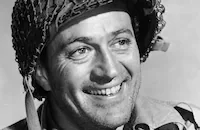
Don Haggerty
Fred Grahame
Ruth Lee
Ruthelma Stevens
Lois Austin
Alan Dinehart Iii
Vince Gironda
Armand Tanny
Phil Arnold
Tom Daly
Al Murphy
Theodore Rand
Joey Ray
Carl Sklover
Keith Mcconnell
Al Rhein
Herbert Lytton
Nelson Leigh
Janice Hood
Jane Easton
Dorothy Abbott
Allen Matthews
Smoki Whitfield
Billy Vernon
Darrell Huntley
Gene Roth
Jimmy Dime
Paul Bakanas
Art Dupuis
Earl Breithard
Albert Morin
Michael Mark
Bruce Cameron

Greg Barton
Jack Shea

Gene Evans
Mike Lally
Sam Shack
Ralph Volkie
James Parnell
Bill Erwin
Mike Mahoney
Jamie Russell
Richard Norris
Dave Ormond
Barbara Freking
Wendell Niles
Bill Yaeger
John Morgan
Joan Jordan
Joan Whitney
Sylvia Lewis
Paul Frees
Frank O'connor
Crew
C. Bakaleinikoff
Esther Berman
Mel Berns
Layne Britten
John E. Burch
Robert Campbell
Philip G. Cochran
Philip G. Cochran
Charlie Cohn
Francis Cugat
Albert S. D'agostino
Harry D'arcy
Walter Daniels
Evelyn Earle
Fred A. Fleck
Jules Furthman
Jules Furthman
Jules Furthman
George Gall
Larry Germain
Feild Gray
Bob Hauser
Winton C. Hoch
Chandler House
Jimmy House
Howard Hughes
Bronislau Kaper
Danny Kelleher
Terry Kellum
Edward Killy
Fred Knudtson
Hans Koenekamp
James Lane
Jack Lannon
Annabell Levy
Harold Lewis
Tony Lombardo
Paul Mantz
Stanley Margulies
Harry Marker
Michael R. Mcadam
Dixie Mccoy
Harley Miller
William M. Moore
Captain J. S. Nash
Henry Ogilvie
Webb Overlander
Eddie Pyle
Louis Shapiro
Brig. Gen. Clarence A. Shoop
Darrell Silvera
Dick Stockton
Mary Tate
Rod Tolmio
Harold Wellman
Henry West
Ralph Wildman
Jim Wilkinson
Earl Wolcott
Michael Woulfe
Sidney Zipser

Film Details
Technical Specs

Articles
Kenneth Tobey (1917-2003)
Born in Oakland, California on March 23, 1917, Tobey originally intended to be a lawyer before a stint with the University of California Little Theater changed his mind. From there, he went straight to New York and spent nearly two years studying acting at the Neighborhood Playhouse, where his classmates included Gregory Peck, Eli Wallach and Tony Randall. Throughout the '40s, Tobey acted on Broadway and in stock before relocating to Hollywood. Once there, Tobey soon found himself playing a tough soldier in films like I Was a Male War Bride and Twelve O' Clock High (both 1949); or a tough police officer in Kiss Tomorrow Goodbye and Three Secrets (both 1950). Such roles were hardly surprising, given Tobey's craggy features, unsmiling countenance and rough voice.
Needless to say, no-nonsense, authority figures would be Tobey's calling for the remainder of his career; yet given the right role, he had the talent to make it memorable: the smart, likeable Captain Hendrey in The Thing From Another World (1951); the gallant Colonel Jack Evans in the "prehistoric dinosaur attacks an urban center" genre chiller The Beast from 20,000 Fathoms (1953, a must-see film for fans of special effects wizard, Ray Harryhausen; and as Bat Masterson, holding his own against Kirk Douglas and Burt Lancaster in Gunfight at the O.K. Corral (1957).
Television would also offer Tobey much work: he had his own action series as chopper pilot Chuck Martin in Whirlybirds (1957-59); and had a recurring role as Assistant District Attorney Alvin in Perry Mason (1957-66). He would also be kept busy with guest appearances in countless westerns (Gunsmoke, Bonanza, The Virginian) and cop shows (The Rockford Files, Barnaby Jones, Ironside) for the next two decades. Most amusingly, the tail end of Tobey's career saw some self-deprecating cameo spots in such contemporary shockers as The Howling (1981); Strange Invaders (1983) and his role reprisal of Captain Hendry in The Attack of the B-Movie Monsters (2002). Tobey is survived by a daughter, two stepchildren, and two grandchildren.
by Michael T. Toole

Kenneth Tobey (1917-2003)
Quotes
Trivia
The movie was actually completed in 1950, although not released until 1957.
The US Air Force, still taking advantage of Chuck Yeager's 1947 supersonic flight for publicity, offered his services as a stunt pilot. During a stunt involving the inverted dive of an F-86, Yeager misjudged the dive and overstressed the plane's tail, causing the horizontal stabilizer to come apart while he was too low to eject. He barely managed to pull out.
In a later flight, his plane's engine lost a turbine disk during a routine climb, forcing a dead-stick landing.
Howard Hughes intended to show off the latest in aircraft technology. By the time this film was actually released to the public, in 1957, the aircraft was actually obsolete.
Features a night intercept of a B-36B by a Lockheed F-94A Starfire. Although the scene is very dark, the rarely seen retractable 20mm cannon turrets of the B-36B are visible in the extended position.
Notes
Jules Furthman's credit reads: "Written and produced by Jules Furthman." According to a September 13, 1948 Hollywood Reporter article, Paul Short bought the original story for Jet Pilot, written by Robert Hardy Andrews, and planned to produce the film with a cast including Audie Murphy, Rory Calhoun and Rhonda Fleming. On September 23, 1948, however, Daily Variety reported that producer and aviation pioneer Howard Hughes had purchased the story, which the article erroneously stated was written by Short.
Tight security and multiple personnel changes marked the film's complicated production history, which, according to various sources, lasted more than eighteen months. According to late 1949 Hollywood Reporter news items, Hughes considered George Marshall as a director. Modern sources indicate that Hughes briefly hired director Peter Godfrey, then replaced him with Josef von Sternberg, who worked on the film until February 1950. According to a June 1949 Hollywood Reporter item, Robert Stevenson was also considered to direct, and Robert Sparks to produce. Hollywood Reporter news items and modern sources note that several directors shot background and 2d unit footage for the picture, including Jules Furthman, Byron Haskin and Don Siegel.
Hollywood Reporter news items recount several delays in production due to last-minute script changes, retakes and budget cutting. According to a November 21, 1949 Hollywood Reporter article, the Air Force cooperated with the production, which required tight security measures. Hughes hired experienced fliers to pilot the military jets, including, according a modern source, world-famous pilot Chuck Yeager, who had broken the sound barrier in 1947. Information found in Hollywood Reporter items and the RKO production files contained at the UCLA Arts-Special Collections Library list various locations for the filming, including such Air Forces bases as March Field, Hamilton Field and Edwards in California, Lowry Field in Colorado, Kelly Field in Texas, and Eglin Field in Florida; Metro Airport in Los Angeles, San Antonio, TX, North Dakota, Reno and Las Vegas, NV and others. Jet Pilot marked the last released film of actor Richard Rober. The actor died in May 1952. Modern sources add the following photographers to the crew: William Clothier, Thomas Turwiler, Hans Koenecamp, Harold Willman and Kenneth Peach.
Although release dates for Jet Pilot were announced in Hollywood Reporter news items in 1951, 1953 and 1955, in February 1957, it was included in a package of completed films that RKO sold to Universal-International, when that studio took over the U. S. and Canadian distribution and sales of all RKO films. Before this deal, Hughes had loaned RKO $8,000,000, using The Conqueror and Jet Pilot as collateral toward the loans. (For more information on the transaction, please consult the note for The Conqueror, above.) Jet Pilot marked the earliest RKO production eventually to be released by Universal. The film received universally poor reviews, with the New York Times reviewer referring to it as "silly and sorry" and concluding "It is a dud."

Miscellaneous Notes
Released in United States Fall September 1957
Released in United States on Video September 17, 1992
Began shooting December 1949.
Completed shooting March 1950.
Howard Hughes and writer Jules Furthman reshot a lot of the film.
Last film of Josef von Sternberg. Although he shot a few other films after 1950, this was the last film of his to be released after Hughes spent seven years recutting it.
Released in United States Fall September 1957
Released in United States on Video September 17, 1992













